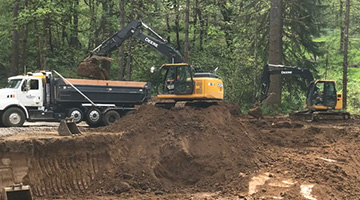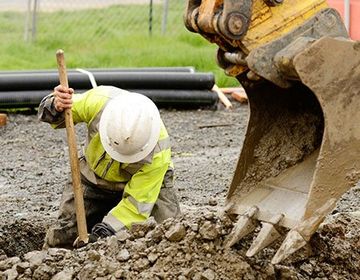Lancaster Trenching - Specialist Trenching Solutions in Lancaster, Ohio
Lancaster Trenching - Specialist Trenching Solutions in Lancaster, Ohio
Blog Article
Comprehensive Excavation Techniques: Grasping the Fundamentals for Success
The cautious planning, precise execution, and meticulous focus to information called for in excavation tasks require a thorough strategy that incorporates numerous basic facets. The real proficiency lies not just in recognizing these principles yet in perfectly integrating them to navigate the intricacies of excavation tasks with finesse.
Understanding Excavation Project Preparation

The initial phase of any kind of excavation task is the planning stage, where vital choices are made that can significantly impact the result of the job. Recognizing the job timeline, spending plan, and extent constraints is important for producing a detailed excavation strategy that makes certain the task's success.
One trick element of excavation project preparation is the development of a thorough timeline that details the sequence of deadlines, turning points, and tasks. By carefully taking into consideration all these factors throughout the planning phase, excavation projects can be implemented effectively and efficiently, leading to effective results - lancaster trenching.
Soil Evaluation and Site Evaluation
Performing extensive soil analysis and website evaluation is a critical action in the prep work stage of any kind of excavation job. Soil analysis includes establishing the composition, structure, and properties of the soil at the excavation site. This info is vital for comprehending the dirt's bearing ability, dampness content, and potential for erosion, which are key aspects in figuring out the excavation approaches and equipment needed for the project.
Site assessment goes past dirt evaluation and encompasses a more comprehensive analysis of the total website conditions. This evaluation includes identifying any prospective threats, such as below ground utilities, ecological problems, or unstable terrain, that could impact the excavation process. By extensively evaluating the site, job supervisors can establish reliable excavation techniques that prioritize safety and security, performance, and environmental management.
Using sophisticated technologies like ground-penetrating radar, soil tasting, and drone studies can improve the accuracy and performance of dirt analysis and site assessment. Spending time and resources in these preliminary steps can eventually conserve time and stop costly delays or difficulties throughout the excavation process.
Tools Choice and Usage
Efficient excavation tasks depend heavily on critical devices selection and application to make sure optimum efficiency and productivity. Picking the ideal equipment for the work is vital in making the most of performance and lessening downtime. Factors such as the sort of soil, deepness of excavation, and job range play a significant duty in identifying one of the most appropriate tools for the task handy.

Along with selecting the proper tools, proper use is vital to task success. Operators must be trained to handle the equipment safely and effectively - lancaster excavation. Normal upkeep checks and timely repairs help avoid malfunctions and make sure regular performance throughout the project
Safety Measures and Regulations Conformity
In the world of excavation jobs, prioritizing precaution and conformity with guidelines is critical to guaranteeing a protected and legally audio functional atmosphere. Precaution incorporate a variety of practices, consisting of performing detailed website assessments, implementing correct signage and obstacles, and supplying adequate safety training for all employees associated with the excavation procedure. Adherence to regulations, such as OSHA demands in the USA, guarantees that the excavation task satisfies the essential requirements to protect employees, bystanders, and the surrounding setting.

Monitoring Progression and Adjusting Methods
Exactly how can project managers properly track the improvement of excavation jobs and adapt their approaches accordingly to optimize results? Monitoring progression is crucial for ensuring that excavation projects remain on track and meet target dates. Job managers can make use of different tools and strategies to track development, such as daily find out progression reports, regular website assessments, and advanced surveillance technologies like drones and GPS tracking systems. By continuously keeping track of the task's improvement, managers can recognize any possible delays or problems beforehand and take positive actions to address them.

Final Thought
To conclude, mastering the principles of extensive excavation strategies is necessary for the success of any kind of job. By understanding job planning, analyzing dirt and site problems, choosing appropriate devices, following safety and security policies, and monitoring progress, job managers can make certain a smooth and reliable excavation process. Applying these techniques will certainly result in effective outcomes and lessen possible threats or problems throughout the excavation job.
The initial phase of any kind of excavation task is the preparation stage, where critical decisions are made that can significantly impact the outcome of the project. Understanding the job budget, timeline, and scope restraints is important for developing an extensive excavation strategy that ensures the project's success.
How can predict supervisors efficiently track the innovation of excavation tasks and adjust their techniques accordingly to enhance end results? By very closely More Info monitoring progression and being prepared to adapt strategies, job managers can improve the general success of excavation jobs.
By recognizing task preparation, examining dirt and website conditions, choosing proper equipment, abiding with safety and security laws, and monitoring progression, task supervisors can make sure a smooth and reliable excavation procedure.
Report this page